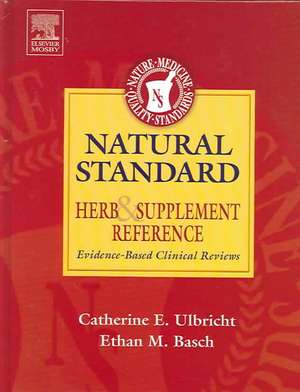Natural Standard Herb and Supplement Reference: Evidence-Based Clinical Reviews
Autor Natural Standard Editat de Catherine Ulbricht, Ethan Baschen Limba Engleză Hardback – 19 ian 2005
Preț: 743.33 lei
Preț vechi: 782.45 lei
-5% Nou
Puncte Express: 1115
Preț estimativ în valută:
142.25€ • 147.67$ • 118.62£
142.25€ • 147.67$ • 118.62£
Cartea nu se mai tipărește
Doresc să fiu notificat când acest titlu va fi disponibil:
Se trimite...
Preluare comenzi: 021 569.72.76
Specificații
ISBN-13: 9780323029940
ISBN-10: 0323029949
Pagini: 1040
Dimensiuni: 216 x 276 mm
Greutate: 2.29 kg
Editura: Elsevier Health Sciences
ISBN-10: 0323029949
Pagini: 1040
Dimensiuni: 216 x 276 mm
Greutate: 2.29 kg
Editura: Elsevier Health Sciences
Cuprins
Introduction
Monographs
1.Acidophilus (Lactobacillus)
2.Alfalfa
3.Aloe
4.Antineoplastons
5.Arginine
6.Artichoke
7.Astragalus
8.Barley
9.Belladonna
10.Betel Nut
11.Bilberry
12.Bitter Almond
13.Bitter Melon
14.Black Cohosh
15.Black Tea
16.Bladderwrack/Seaweed/Kelp
17.Blessed Thistle
18.Boron
19.Bromelain
20.Burdock
21.Calendula
22.Chamomile
23.Chaparral
24.Chasteberry
25.Chondroitin
26.Clay
27.Clove
28.Coenzyme Q10
29.Cranberry
30.Creatine
31.Dandelion
32.Danshen
33.Devil's Claw
34.DHEA
35.Dong Quai
36.Echinacea
37.Elderberry and Elder Flower
38.Ephedra
39.Essiac
40.Eucalyptus
41.Evening Primrose Oil
42.Eyebright
43.Fenugreek
44.Feverfew
45.Fish Oil/Omega-3 Fatty Acids
46.Flaxseed
47.Garlic
48.Ginger
49.Ginkgo
50.Ginseng
51.Glucosamine
52.Goldenseal
53.Gotu Kola
54.Green Tea
55.Guggul
56.Gymnema
57.Hawthorn
58.Hops
59.Horse Chestnut
60.Horsetail
61.Hoxsey
62.Kava
63.Lavender
64.Licorice
65.Lycopene
66.Maitake
67.Marshmallow
68.Melatonin
69.Milk Thistle
70.Niacin
71.Oleander
72.Passion Flower
73.PC-SPES
74.Pennyroyal
75.Peppermint
76.Polypodium Leuctomos
77.Propolis
78.Psyllium
79.Pycnogenol
80.Pygeum
81.Red Clover
82.Red Yeast
83.Saw Palmetto
84.Shark Cartilage
85.Slippery Elm
86.Soy
87.Spirulina
88.St. John's Wort
89.Sweet Almond
90.Tea Tree Oil
91.Thyme
92.Turmeric (Curcumin)
93.Valerian
94.White Horehound
95.Wild Yam
96.Yohimbe Bark Extract
Appendices
Interactions Tables
- Natural Standard
- Monograph Methodology
- Natural Standard Grading System
- CAM Use in the United States
- CAM Research
- Prevalence
- Safety Concerns
- Standardization
- Patient-Clinician Communication
- Senior Editors
- Authors
- Translators
- Research Team
- Technical Team
Monographs
1.Acidophilus (Lactobacillus)
2.Alfalfa
3.Aloe
4.Antineoplastons
5.Arginine
6.Artichoke
7.Astragalus
8.Barley
9.Belladonna
10.Betel Nut
11.Bilberry
12.Bitter Almond
13.Bitter Melon
14.Black Cohosh
15.Black Tea
16.Bladderwrack/Seaweed/Kelp
17.Blessed Thistle
18.Boron
19.Bromelain
20.Burdock
21.Calendula
22.Chamomile
23.Chaparral
24.Chasteberry
25.Chondroitin
26.Clay
27.Clove
28.Coenzyme Q10
29.Cranberry
30.Creatine
31.Dandelion
32.Danshen
33.Devil's Claw
34.DHEA
35.Dong Quai
36.Echinacea
37.Elderberry and Elder Flower
38.Ephedra
39.Essiac
40.Eucalyptus
41.Evening Primrose Oil
42.Eyebright
43.Fenugreek
44.Feverfew
45.Fish Oil/Omega-3 Fatty Acids
46.Flaxseed
47.Garlic
48.Ginger
49.Ginkgo
50.Ginseng
51.Glucosamine
52.Goldenseal
53.Gotu Kola
54.Green Tea
55.Guggul
56.Gymnema
57.Hawthorn
58.Hops
59.Horse Chestnut
60.Horsetail
61.Hoxsey
62.Kava
63.Lavender
64.Licorice
65.Lycopene
66.Maitake
67.Marshmallow
68.Melatonin
69.Milk Thistle
70.Niacin
71.Oleander
72.Passion Flower
73.PC-SPES
74.Pennyroyal
75.Peppermint
76.Polypodium Leuctomos
77.Propolis
78.Psyllium
79.Pycnogenol
80.Pygeum
81.Red Clover
82.Red Yeast
83.Saw Palmetto
84.Shark Cartilage
85.Slippery Elm
86.Soy
87.Spirulina
88.St. John's Wort
89.Sweet Almond
90.Tea Tree Oil
91.Thyme
92.Turmeric (Curcumin)
93.Valerian
94.White Horehound
95.Wild Yam
96.Yohimbe Bark Extract
Appendices
Interactions Tables
- TABLE 1: Herbs with Potential Hypoglycemic or Hyperglycemic Properties
- TABLE 2: Herbs and Supplements with Potential Hepatotoxic Effects
- TABLE 3: Herbs and Supplements with Possible Hypotensive or Hypertensive Properties
- TABLE 4: Herbs with Potential Progestational or Estrogenic Activity
- TABLE 5: Herbs with Known or Potential Diuretic Properties
- TABLE 6: Herbs/Supplements with Possible Sedating Properties
- TABLE 7: Herbs with Potential Cardiac Glycoside Properties
- TABLE 8: Cytochrome P450: Selected Substrates, Inhibitors, & Inducers
- TABLE 9: Selective Serotonin Reuptake Inhibitors (SSRI)
- TABLE 10: Monoamine Oxidase Inhibitors (MAOIs)
- TABLE 11: Tyramine/Tryptophan Containing Foods (risk of hypertensive crisis with MAOIs)
- TABLE 11: Herbs with Laxative/Stimulant Laxative Properties
